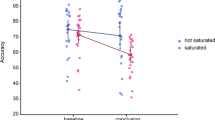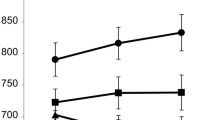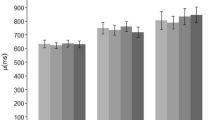Abstract
Deleterious consequences of cognitive fatigue might be avoided if people respond with increased effort to increased demands. In this study, we hypothesized that the effects of fatigue would be more pronounced in cognitive functions reflecting compensatory effort. Given that the P3a event-related potential is sensitive to the direction and amount of attention allocated to a stimulus array, we reasoned that compensatory effort would manifest in increased P3a amplitudes. Therefore, we compared P3a before (pre-test) and after (post-test) a 2 h long cognitively demanding (fatigue group, n = 18) or undemanding task (control group, n = 18). Two auditory tasks, a three-stimulus novelty oddball and a duration discrimination two-choice response task were presented to elicit P3a. In the fatigue group, we used the multi-attribute task battery as a fatigue-inducing task. This task draws on a broad array of attentional functions and imposed considerable workload. The control group watched mood-neutral documentary films. The fatigue manipulation was effective as subjective fatigue increased significantly in the fatigue group compared to controls. Contrary to expectations, however, fatigue failed to affect P3a in the post-test phase. Similar null effects were obtained for other neurobehavioral measures (P3b and behavioral performance). Results indicate that a moderate increase in subjective fatigue does not hinder cognitive functions profoundly. The lack of objective performance loss in the present study suggests that the cognitive system can be resilient against challenges instigated by demanding task performance.


Similar content being viewed by others
References
Ackerman PL, Kanfer R (2009) Test length and cognitive fatigue: an empirical examination of effects on performance and test-taker reactions. J Exp Psychol Appl 15:163–181
Ackerman PL, Kanfer R, Shapiro SW et al (2010) Cognitive fatigue during testing: an examination of trait, time-on-task, and strategy influences. Hum Perform 23:381–402
Andrés P, Parmentier FBR, Escera C (2006) The effect of age on involuntary capture of attention by irrelevant sounds: a test of the frontal hypothesis of aging. Neuropsychologia 44:2564–2568
Anguera JA, Bernard JA, Jaeggi SM et al (2012) The effects of working memory resource depletion and training on sensorimotor adaptation. Behav Brain Res 228:107–115
Barkaszi I, Czigler I, Balázs L (2013) Stimulus complexity effects on the event-related potentials to task-irrelevant stimuli. Biol Psychol 94:82–89
Barkaszi I, Takács E, Czigler I, Balázs L (2016) Extreme environment effects on cognitive functions: a longitudinal study in high altitude in Antarctica. Front Hum Neurosci 10:1–12
Baumeister RF (2002) Ego depletion and self-control failure: an energy model of the self’s executive function. Self Identity 1:129–136
Beckers DGJ, Van Der Linden D, Smulders PGW et al (2008) Voluntary or involuntary? Control over overtime and rewards for overtime in relation to fatigue and work satisfaction. Work Stress 22:33–50
Benoit CE, Solopchuk O, Borragán G, Carbonnelle A, Van Durme S, Zénon A (2018) Cognitive task avoidance correlates with fatigue-induced performance decrement but not with subjective fatigue. Neuropsychologia. https://doi.org/10.1016/j.neuropsychologia.2018.06.017
Blain B, Hollard G, Pessiglione M (2016) Neural mechanisms underlying the impact of daylong cognitive work on economic decisions. Proc Natl Acad Sci 113:6967–6972
Boksem MAS, Meijman TF, Lorist MM (2005) Effects of mental fatigue on attention: an ERP study. Cogn Brain Res 25:107–116
Boksem MAS, Meijman TF, Lorist MM (2006) Mental fatigue, motivation and action monitoring. Biol Psychol 72:123–132
Borragán G, Slama H, Bartolomei M, Peigneux P (2017) Cognitive fatigue: a time-based resource-sharing account. Cortex 89:71–84
Brewer G, Spillers GJ, McMillan B, Unsworth N (2011) Extensive performance on the antisaccade task does not lead to negative transfer. Psychon Bull Rev 18:923–929
Chong H, Riis JL, McGinnis SM et al (2008) To ignore or explore: top-down modulation of novelty processing. J Cogn Neurosci 20:120–134
Comstock JR, Arnegard RJ (1992) The multi-attribute task battery for human operator workload and strategic behavior research. NASA Langley Research Center, Hampton, VA
Delorme A, Makeig S (2004) EEGLAB: An open source toolbox for analysis of single-trial EEG dynamics including independent component analysis. J Neurosci Methods 134:9–21
Dinges DF, Powell JW (1985) Microcomputer analyses of performance on a portable, simple visual RT task during sustained operations. Behav Res Methods Instrum Comput 17:652–655
Escera C, Corral MJ (2007) Role of mismatch negativity and novelty-P3 in involuntary auditory attention. J Psychophysiol 21:251–264
Esterman M, Reagan A, Liu G et al (2014) Reward reveals dissociable aspects of sustained attention. J Exp Psychol Gen 143:2287–2295
Friedman D, Kazmerski VA, Cycowicz YM (1998) Effects of aging on the novelty P3 during attend and ignore oddball tasks. Psychophysiology 35:508–520
Friedman D, Cycowicz YM, Gaeta H (2001) The novelty P3: an event-related brain potential (ERP) sign of the brain’s evaluation of novelty. Neurosci Biobehav Rev 25:355–373
Gergelyfi M, Jacob B, Olivier E, Zénon A (2015) Dissociation between mental fatigue and motivational state during prolonged mental activity. Front Behav Neurosci 9:176
Harris WC, Hancock PA, Erik J et al (1995) Performance, workload, and fatigue changes associated with automation. Int J Aviat Psychol 5:169–185
Hart SG, Staveland LE (1988) Development of NASA-TLX (Task Load Index): results of empirical and theoretical research. Adv Psychol 52:139–183
Hockey GRJ (2011) A motivational control theory of cognitive fatigue. In: Ackerman PL (ed) Cognitive fatigue: Multidisciplinary perspectives on current research and future applications. American Psychological Association, pp 167–187. https://doi.org/10.1037/12343-008
Hopstaken JF, van der Linden D, Bakker AB, Kompier MAJ (2015a) A multifaceted investigation of the link between mental fatigue and task disengagement. Psychophysiology 52:305–315
Hopstaken JF, van der Linden D, Bakker AB, Kompier MAJ (2015b) The window of my eyes: task disengagement and mental fatigue covary with pupil dynamics. Biol Psychol 110:100–106
Kanfer R (2011) Determinants and consequences of subjective cognitive fatigue. In: Ackerman Phillip L (ed) Cognitive fatigue: Multidisciplinary perspectives on current research and future applications. American Psychological Association, pp 189–207. https://doi.org/10.1037/12343-009
Kato Y, Endo H, Kizuka T (2009) Mental fatigue and impaired response processes: event-related brain potentials in a Go/NoGo task. Int J Psychophysiol 72:204–211
Kelly SP, O’Connell RG (2013) Internal and external influences on the rate of sensory evidence accumulation in the human brain. J Neurosci 33:19434–19441
Klaassen EB, Evers EAT, de Groot RHM et al (2014) Working memory in middle-aged males: age-related brain activation changes and cognitive fatigue effects. Biol Psychol 96:134–143
Kok A (2001) On the utility of P300 amplitude as a measure of processing capacity. Psychophysiology 38:557–577
Lee K, Hicks G, Nino-Murcia G (1991) Validity and reliability of a scale to assess fatigue. Psychiatry Res 36:291–298
Legrain V, Bruyer R, Guérit JM, Plaghki L (2005) Involuntary orientation of attention to unattended deviant nociceptive stimuli is modulated by concomitant visual task difficulty. Evidence from laser evoked potentials. Clin Neurophysiol 116:2165–2174
Lim J, Dinges DF (2010) A meta-analysis of the impact of short-term sleep deprivation on cognitive variables. Psychol Bull 136:375–389
Lorist MM, Klein M, Nieuwenhuis S et al (2000) Mental fatigue and task control: planning and preparation. Psychophysiology 37:614–625
Luck SJ, Gaspelin N (2017) How to get statistically significant effects in any ERP experiment (and why you shouldn’t). Psychophysiology 54:146–157
Massar SAAS, Wester AEA, Volkerts EER, Kenemans JL (2010) Manipulation specific effects of mental fatigue: evidence from novelty processing and simulated driving. Psychophysiology 47:1119–1126
Meijman TF (2000) The theory of the STOP-emotion: on the functionality of fatigue. Ergon Glob Qual Saf Prod 45–50
Muller-Gass A, Macdonald M, Schröger E et al (2007) Evidence for the auditory P3a reflecting an automatic process: elicitation during highly-focused continuous visual attention. Brain Res 1170:71–78
Oatley K, V TMS, Jenkins JM (1992) Human emotions: function and dysfunction. Annu Rev Psychol 43:55–85
Persson J, Welsh KM, Jonides J, Reuter-Lorenz PA (2007) Cognitive fatigue of executive processes: interaction between interference resolution tasks. Neuropsychologia 45:1571–1579
Persson J, Larsson A, Reuter-Lorenz P (2013) Imaging fatigue of interference control reveals the neural basis of executive resource depletion. J Cogn Neurosci 25:338–351
Rozand V, Lebon F, Papaxanthis C, Lepers R (2015) Effect of mental fatigue on speed-accuracy trade-off. Neuroscience 297:219–230
SanMiguel I, Corral M-J, Escera C (2008) When loading working memory reduces distraction: behavioral and electrophysiological evidence from an auditory-visual distraction paradigm. J Cogn Neurosci 20:1131–1145
Sarter M, Gehring WJ, Kozak R (2006) More attention must be paid: the neurobiology of attentional effort. Brain Res Rev 51:145–160
Schomaker J, Meeter M (2015) Short- and long-lasting consequences of novelty, deviance and surprise on brain and cognition. Neurosci Biobehav Rev 55:268–279
Schröger E, Wolff C (1998) Behavioral and electrophysiological effects of task-irrelevant sound change: a new distraction paradigm. Cogn Brain Res 7:71–87
Schröger E, Giard MH, Wolff C (2000) Auditory distraction: event-related potential and behavioral indices. Clin Neurophysiol 111:1450–1460
Squires KC, Hillyard SA, Lindsay PH (1973) Vertex potentials evoked during auditory signal detection: relation to decision criteria. Percept Psychophys 14:265–272
Sussman ES, Winkler I, Schröger E (2003) Top-down control over involuntary attention switching in the auditory modality. Psychon Bull Rev 10:630–637
Tucker P, Folkard S, Macdonald I (2003) Rest breaks and accident risk. Lancet 361:680
Tucker AM, Whitney P, Belenky G et al (2010) Effects of sleep deprivation on dissociated components of executive functioning. Sleep 33:47–57
van der Linden D (2011) The urge to stop: the cognitive and biological nature of acute mental fatigue. Cogn Fatigue Multidiscip Perspect Curr Res Futur Appl 149–164
Van Der Hulst M, Geurts S (2001) Associations between overtime and psychological health in high and low reward jobs. Work Stress 15:227–240
van der Linden D, Frese M, Meijman TF (2003) Mental fatigue and the control of cognitive processes: effects on perseveration and planning. Acta Psychol (Amst) 113:45–65
van der Linden D, Massar SAA, Schellekens AFA et al (2006) Disrupted sensorimotor gating due to mental fatigue: preliminary evidence. Int J Psychophysiol 62:168–174
Venables L, Fairclough SH (2009) The influence of performance feedback on goal-setting and mental effort regulation. Motiv Emot 33:63–74
Verleger R, Jaśkowski P, Wascher E (2005) Evidence for an integrative role of P3b in linking reaction to perception. J Psychophysiol 19:165–181
Wilson GF, Caldwell JA, Russell CA (2007) Performance and psychophysiological measures of fatigue effects on aviation related tasks of varying difficulty. Int J Aviat Psychol 17:219–247
Winkler I, Haufe S, Tangermann M (2011) Automatic classification of artifactual ICA-components for artifact removal in EEG signals. Behav Brain Funct 7:30
Zhang P, Chen X, Yuan P et al (2006) The effect of visuospatial attentional load on the processing of irrelevant acoustic distractors. Neuroimage 33:715–724
Acknowledgements
We would like to thank Péter Nagy for valuable contribution to data analysis and Tamás Fodor for programming the VAS-F scale.
Funding
This study was funded by a Hungarian Ministry of National Development Grant URK10297.
Author information
Authors and Affiliations
Corresponding author
Ethics declarations
Conflict of interest
The authors declare that they have no conflict of interest.
Electronic supplementary material
Below is the link to the electronic supplementary material.
Rights and permissions
About this article
Cite this article
Takács, E., Barkaszi, I., Altbäcker, A. et al. Cognitive resilience after prolonged task performance: an ERP investigation. Exp Brain Res 237, 377–388 (2019). https://doi.org/10.1007/s00221-018-5427-8
Received:
Accepted:
Published:
Issue Date:
DOI: https://doi.org/10.1007/s00221-018-5427-8




